01 March 2024
Tiny microbes, big impacts
A world-leading microbiome research centre based at Teagasc and UCC, APC Microbiome Ireland has spent twenty years at the forefront of this dynamic and ever-prevalent field of research.
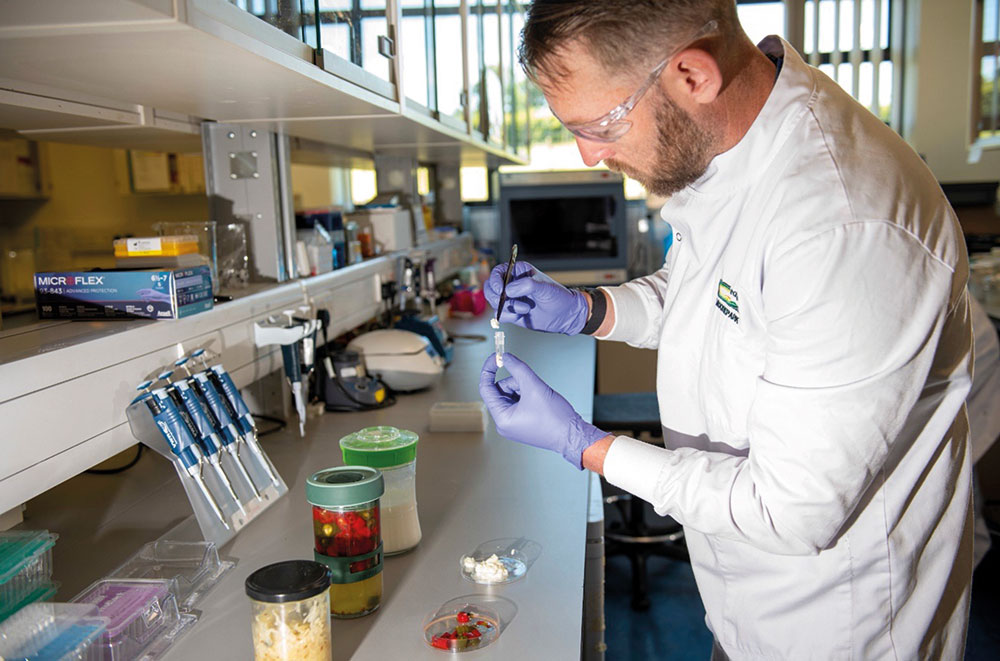
John Leech, Teagasc Technologist and Research Officer, preparing fermented foods for analysis
Last December, the world-leading SFI microbiome research centre, APC Microbiome Ireland, celebrated the 20th anniversary of its founding with an event at University College Cork.
Based at Teagasc and UCC, APC was formed in 2003 with funding from Science Foundation Ireland, with a mission to investigate the complex environment of the gastrointestinal tract and its microbial community. In the 20 years since, it has established itself as one of the world’s leading centres of research of gut and other microbiomes — dynamic and complex areas of research with relevance to both the food and pharmaceutical sectors.
Over two decades, APC has made several landmark discoveries and has published over 3,000 research articles in peer-reviewed journals. The significance of this research was celebrated with the publication of 20 Years of APC Impact, highlighting some of the ground-breaking research on major societal challenges that APC has contributed to addressing, including chronic and infectious disease, anti-microbial resistance and sustainable food development. Many Teagasc scientists have played important roles in this research, particularly in the fields of food, health and wellbeing, sustainability, climate change and early life nutrition.
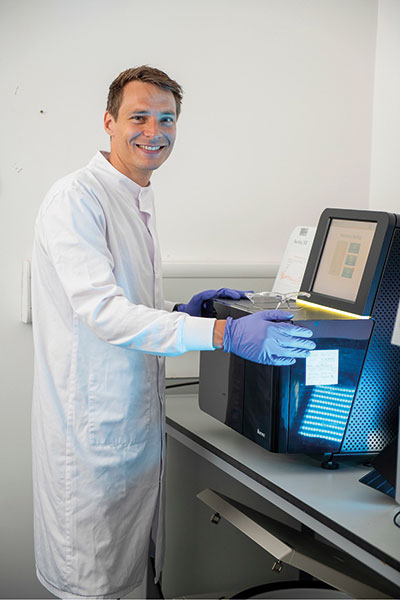
Samuel Mortensen, Teagasc and APC Postdoctoral Researcher preparing a run in the DNA Sequencing Centre at Teagasc. The centre is a critical piece of infrastructure for APC’s microbiome studies
Gut instinct
Teagasc and APC researchers have been studying the links between diet, exercise and microbiome composition, from ancient fermented foods to high-achieving athletes.
Paul Cotter and his Vision 1 lab group have demonstrated that fermented foods benefit the gut microbiome, and have identified bacteria (and their genes) that can promote human health, and in other research have demonstrated the influence that specific food bacteria have on the flavour of food.
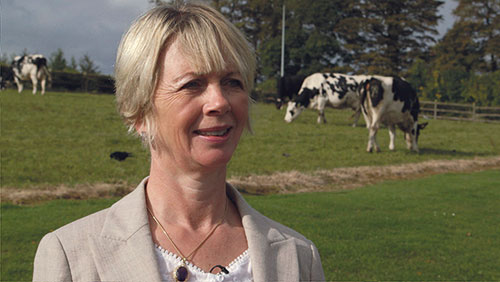
Catherine Stanton appearing on “10 Things to Know About…Guts” in 2015
Paul Cotter also co-ordinated the EU Innovation Action MASTER project which brought together 29 partners to develop new microbial strains, foods, feeds, processes and databases of relevance to the food chain, all with sustainability in mind. APC researchers were involved in the sequencing of DNA from food samples, resulting in the creation of a reference database with 10,000 microbial genomes. This has resulted in it now being easier to rapidly identify microbes in the food chain, and use the information to improve food quality and safety.
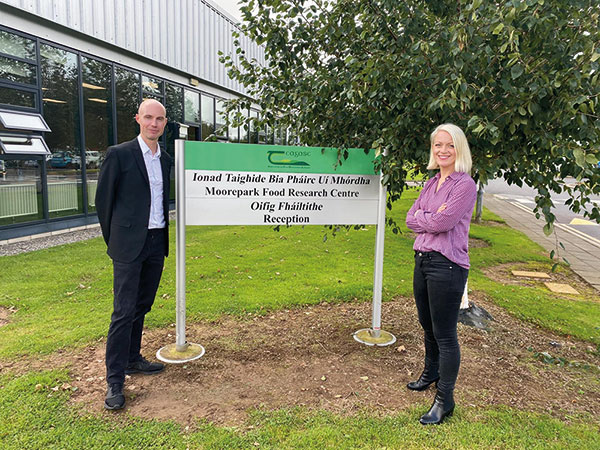
Paul Cotter appearing on “10 Things to Know About…Viruses” in 2020
The study of microbiome composition and its links to physical fitness, athletic performance and recovery has been the subject of Orla O’Sullivan’s research with APC. As part of her research, Orla has worked with athletes from the IRFU, Cricket Ireland, Sports Ireland Institute, Ironman Indiana and a Premier League soccer team, investigating how changing the gut microbiome can improve performance or aid muscle recovery. A study of the Irish rugby team, published in the prestigious journal Gut in 2017, showed that the athlete’s microbiome is primed for tissue repair and to harness energy from the diet, reflecting the significant energy demands and high cell-turnover evident in elite sport.
Tackling emissions
Methane is a greenhouse gas released by ruminant animals such as cows and sheep as a bi-product of microbial fermentation in the rumen and large intestine. Reducing the volume of methane originating from ruminant livestock will be required for Ireland to reach its emissions reduction targets by 2030. APC researchers led by Catherine Stanton have been studying the potential use of Lactic Acid Bacteria (LAB) to reduce methane emissions in ruminant animals. LAB are already used in the animal diet to boost health and production. On the MethLAB project, after testing on farm and in the laboratory, two LAB strains were identified which could markedly reduce methane emissions from cows, with no effect on animals’ health or production parameters assessed. Similarly, APC researchers have studied the use of probiotics and other bacterial molecules and strains to positively support the gut microbiome of livestock such as cows, pigs and sheep.
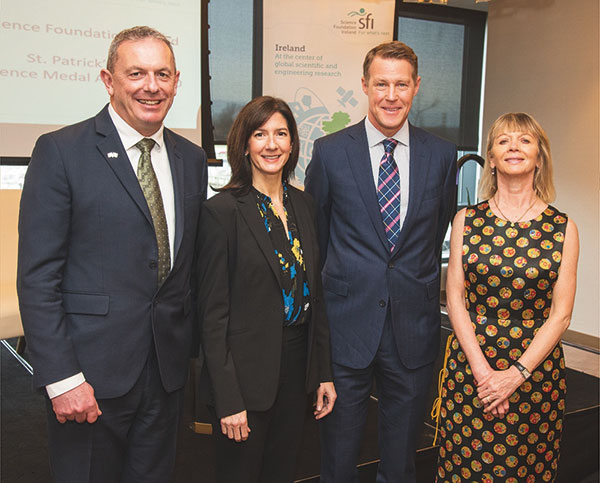
Catherine Stanton (far right) at the announcement of the MiMIC project in Washington DC in March 2020
Starting advantage
Research led by Catherine has established that the infant gut microbiome is altered depending on mode of delivery (vaginal birth or C-section), antibiotic usage, formula feeding and premature birth. Based on the findings from these studies, Cork University Maternity Hospital now gives probiotics to pre-term infants, and published analysis by APC indicates the probiotics help protect vulnerable babies from severe gut infections such as necrotising enterocolitis and mortality. The Missing Microbes in Infants born by C-section (MiMIC) project, a collaboration between APC and IFF (previously DuPont Nutrition & Biosciences) is involved in identifying and isolating gut microbes in early life that play an important role in short and long-term health. The project also develops strategies to balance the gut microbiota in infants following antibiotics administration or C-section delivery.
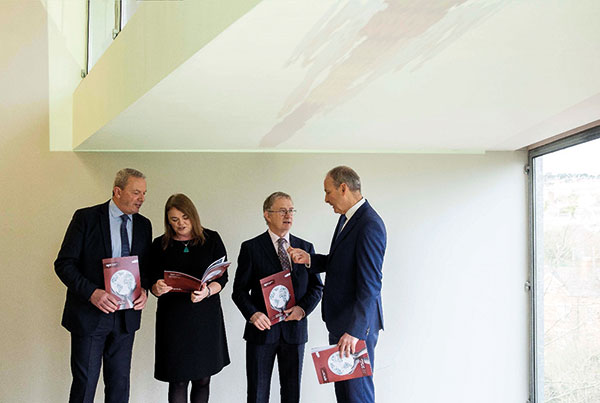
An Tánaiste, Minister for Foreign Affairs and Minister for Defence, Mr. Micheál Martin, T.D. (right) launches a 20 Years Impact brochure for APC Microbiome Ireland at a celebration event in The Glucksman Gallery, UCC, on Friday 15th December
Future challenges
Speaking at the 20th anniversary event, Teagasc Director Frank O’Mara commented:
“APC Microbiome Ireland has made great impacts in the last 20 years on several fronts, particularly in the foods for health sector. But the potential for microbiome science to mitigate climate change and address the sustainability agenda may be the most important one.
“APC researchers at Teagasc and UCC look forward to further impactful science, addressing society’s biggest challenges in food, health and sustainability.”
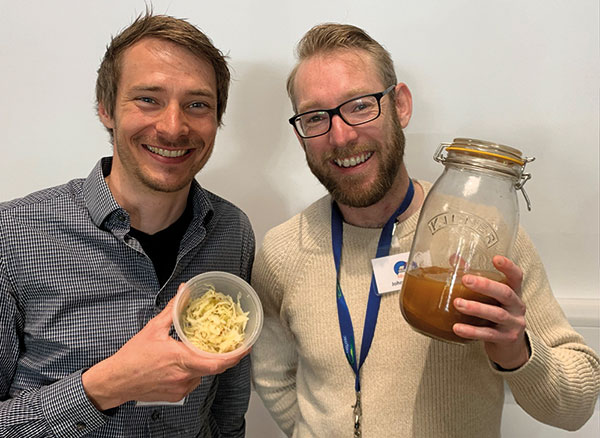
Samuel Mortensen and John Leech with some examples of fermented foods at Kefir Day 2022
Ackowledgements
The brochure APC Microbiome Ireland – 20 years of impact can be found in the publications section of the Teagasc website.
Contributor
Muireann Egan
Communications Officer
Teagasc Food Research Centre,
Moorepark.
muireann.egan@teagasc.ie
[pic credit 1] Teagasc
[pic credit 2] Andrew Downes
[pic credit 3] 10 Things to Know About
[pic credit 4] 10 Things to Know About
[pic credit 5] John Harrington Photography
[pic credit 6] Clare Keogh
[pic credit 7] Tina Darb
